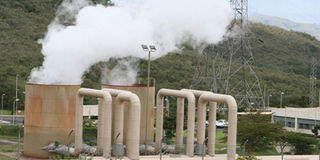Go green to grow faster, steam power company urges counties

PHOTO | FILE The Geothermal Development Company has asked counties with steam potential to work with it for faster power projects implementation.
What you need to know:
- Electricity transmission from production sites to users results to a price increase of 30 per cent
- GDC has already mapped out 14 sites along the Kenyan Rift Valley
Successful exploration of renewable energy will not only lead to a drop in electricity costs, but will also spur industrial and agricultural growth, a company has said.
This will, however, only happen if county governments boost the financial and human resource muscle of the Geothermal Development Company (GDC) to speed up implementation of energy production projects.
According to the company’s managing director, Dr Silas Simiyu, if the devolved units of government invested money in its ventures, modular projects would take a shorter time to be operational.
“Modular power plants can take about three years to implement but with increased investment, they can take less than 18 months. That is why we need the county governments to come in and greatly support our geothermal projects,” said Dr Simiyu.
PRICE INCREASE
Availability of low cost energy, which directly reduces the price of producing goods, could then become a lucrative incentive, attracting many investors to put up heavy energy-consuming industries.
Electricity transmission from production sites to users results to a price increase of 30 per cent.
“But to avoid those transmission costs, the county governments can come up with industrial parks where industries which are heavy consumers of power will be established. Due to use of cheap labour, products made locally will obviously be low-priced and this will encourage consumption,” said Dr Simiyu.
Spin-off commercial activities around the industries and the neighbouring economically viable sites, he said, would employ more than 2.8 million people.
GDC has already mapped out 14 sites along the Kenyan Rift Valley, which collectively have an estimated potential of generating more than 15,000MW of power.
Decline in dependency on thermal sources with growing production of geothermal energy is expected to cut the average consumer tariff of Sh17.87 per KWh to at least Sh8.34 per KWh.
This is expected to happen by 2030 when the company envisions to have drilled 1,400 wells to provide steam for the generation of 5,000MW.
Full green energy operations are expected to begin at the Olkaria plant in Naivasha, generating 280MW which will be fed into the national grid.
“We are expecting that by January next year, we will have started generating 280MW from Olkaria plant and that will be a great boost to the nation’s energy grid,” said the GDC’s chief.
Dairy farming will be another major sector that will benefit from the success of the firm’s operations.
“We will provide industrial heat for processing, cooling, and storing. And this will boost diversification in milk production in counties to enable farmers make more profits,” said Dr Simiyu.
As the company seeks to attain its mission, it faces the hurdle of inadequate personnel with high skills in engineering and sciences.





